By Angela Gunn, Betanews
If there was a more remarkable idea circulating in the gadget-head community back in January than Palm's got a scorching-hot new phone on the way, it was, "And they chose Sprint as the launch partner".
Seriously, Sprint? Necessary only-major-mobile-provider-in-the-heartland evil to tens of thousands of mobile-phone users? Whatever Dan Hesse was saying about customer service in those moodily lit black-and-white commercials, the prospect of putting Sprint in charge of selling the odd, pretty, pricey little Palm Pre was wince-inducing.
But if there's anything sweeter than a comeback story, it's two comeback stories. And so many observers took heart from reports that Sprint was intent on being in fighting trim for the launch -- special training for in-store device "advocates," the ReadyNow no-customer-left-behind push, and so forth. Among those observers was your reporter, a Sprint customer for over a decade who would really, really like her mobile provider to not screw this up.
So the Pre has been out for a little over two weeks, and I've had mine in hand for a week. Every hope I had for the handset has been met -- it's a joy to use, a beauty, the One True Phone that's likely to have me abandoning my long-suffering Sidekicks after all these years. I await more toys in the Apps Store and I wish battery life were better, but it was worth the wait.
And after seeing Sprint's execution on its end of the bargain, I wish I'd waited 'til next year and gotten it from Verizon. After the promises of better customer service in general and laser-like focus on the Pre experience in particular, Sprint seems to be not just as bad as ever but -- due to the phone's unique nature -- just a bit worse.
Let me tell you about my Pre buying experience. Settle in, honey.
Act One: In which we seek a rare gadget and end up in the food court
The calendar over my desk has a big red circle around June 14, and FREE FROM B'BERRY! written in the box. The Pearl was never a good match for me, with its tiny screen and peculiar keypad, but I wanted to give it precisely a year from the date I purchased it -- to be sure I get whatever rebates might apply, and to give the local Sprint stores a chance to restock their Pre supplies after the launch on June 6. I'm not buying "a new phone," after all -- I've already made my decision, even handled an early prototype, and I'm waiting for precisely that phone.
But it's June 14, and the Sprint store downtown is still out of Pres. But I call around, and I find one at the Sprint kiosk at the big mall in my part of town.
This is where it all goes wrong. (And yet you've so much article ahead of you!) What I didn't know then is that, although Sprint had big things to say about how customer service on the Pre would be of unparalleled quality, with in-store "advocates" specially trained on the device, the fact is that the system only applies to the company stores, and I'm heading toward a kiosk. Though it carries Sprint branding, sells Sprint phones, and hands me Sprint contracts to sign, a kiosk is not an official Sprint entity.
I'm going to suffer for not knowing this.
The mall is jumping on a late Sunday afternoon, and the food court (which is where the kiosk is located) sounds like a school lunchroom with no monitors to shush the rowdies. There's a line at the kiosk and one salesgirl working, so I content myself with people-watching and get to the desk in about 40 minutes. Dessetta, the salesgirl, is a little rushed -- she has staff training in about an hour, and the other clerk on duty has disappeared into the sunlight outside -- but I know the phone I want, so we get right down to business.
At this point I should mention two things: 1. I share a mondo-minutes account with a few of my relatives back home, and 2. My brother used to work for Sprint, years ago. Dessetta and I were talking about that while she set up my phone, because all those phone lines can be confusing. I cautioned her to watch out for the other Angela on the account -- my family has a shocking lack of imagination when it comes to names -- and repeated my number, which begins with an area code different from the others on the account.
We wrapped up the sale. I asked about a buyback for my hated BlackBerry, and Dessetta's manager -- he'd wandered over late in the process -- said he could give me $20 store credit, but with no TouchStone chargers available yet (the only other thing I wanted) I should probably just wait and come back. The kiosk doesn't have any special screen protectors for the phone, but Dessetta sells me a five-pack of those trim-your-own protectors. I promise Dessetta that if Sprint's customer-satisfaction people phoned me I would indeed give her "a five" (the system's top rating), and I took my phone to a quiet corner to start checking it out.
“By the time I buy my next Pre, I'll be buying it from Verizon...because if this is Sprint's saving throw, it's pretty clear it has failed.”
|
Already in our story, things are starting to deviate from the script. In theory, had I been at a real Sprint store (instead of a shop that simply has signage like, offers products like, and enters into legal contracts like one) I would have been trained on the phone, to be sure I know how to use all the cool features. ReadyNow, they call it.
However, I didn't think much of that omission; I made it clear that I knew a lot about the Pre already, and my overworked salesgirl was in a hurry to close. And so I'm on my own and walking home when the phone rings... the BlackBerry in my bag, the one that should have been deactivated. My Pre, in my hand, is silent. I check the configuration on the Pre. It's set to my brother's phone number.
My brother is in Nebraska, but as of the moment Dessetta configured my Pre, his phone is effectively in Seattle.
I might want to look into that.
Act Two: In which we are helped by kindly faceless individuals
I call my brother on his house phone and explain the problem. After the momentary weirdness of seeing his own phone come up on Caller ID, we work out that tech support will probably need to speak to both of us, since (again) we all share an account. I call in. I get cut off. I call back. I get "Michael." "Michael" -- I've changed his name -- is going to be the only bright spot of this story, so pay attention.
Michael's a funny guy, and he thinks I'm funny too; Michael and my brother can bond over Sprint work life, so they've got that going for them. The fix is a bit tricky; I have to shut off my phone (and borrow my housemate's; mine is not a landline house), we have to reset parts of the account, we have a lot to do... and as Michael tells us, he's not really trained on the Pre. Tech support has, he says, been told to send callers asking about the Pre directly to the stores, and he warns me that anything he does might cause problems when I file for the $100 mail-in rebate on this $300 phone. But he understands why my brother and I might not want to wait for Monday morning to get the phone number confusion straightened out, and so 85 minutes later, my brother's number rings on his phone in Nebraska, not mine in Seattle.
That fixes the urgent problem, but the Pre still isn't working. Michael offers to transfer me from his line in Texas to a higher-level tech support facility in Florida. He does... and the call drops again. I call back a third time, get transferred again to another tech, who tells me that to do the tech support we'd have to use Sprint's online chat function, which has just shut down for the night. Call back tomorrow.
If I can't play with the pretty new phone, I can at least start trimming down screen protectors to put on it. After a couple of tries at getting the openings located correctly and the curved corners right, I give up and leave on the light plastic film it shipped with.
Entr'acte: In which we are cast out into the wide world
"Ma'am, I'm going to have to send you to the store. We can't do anything from here," said the person on the other end of the tech-support line. "We're not trained on the Pre. Take it on in and they can fix this right away."
"Should I go back to the kiosk, or should I go downtown to the big store?"
"Well, I can't actually say, but..."
"I should go to the store, in other words."
The faintest of chuckles. "Good luck, ma'am."
NEXT: "My Name is Nobody"...
Act Three: In which our true enemy is revealed
The Sprint store in downtown Seattle is an ordinary Sprint storefront, with salespeople up front and a tech-support area in the back. And, unlike the kiosk, this store participates in the ReadyNow no-customer-left-behind program. I headed toward the counter at the back and explained my situation... or started to, anyway.
"Stop," the salesgirl said. Let's call her Heidi, since that's what her nametag said. "I don't need to know any of this. What's your phone number?" I gave her the number and she walked back to have the tech folk reset the phone. They hand the phone back after a few minutes, and Heidi's holding it in her hands. I ask a couple of questions about how things have been going with the Pre in general, but Heidi's not a conversationalist. Instead, she's holding my phone and staring off into space.
She's bored. I'm bored. She pokes at a few buttons, mumbles something about not knowing what's supposed to happen, and starts pecking at my Pre with her long acrylic nails -- first tapping the keypad, then pulling at the protective plastic film.
I clear my throat. "I'm leaving that on there for now. Do you know if they'll be selling any protective sheets? I don't want to scratch --"
An explosive sigh indicates that this too is not necessary information, but she quits picking at the plastic.
"Hey, I have my old BlackBerry with me. What are you guys offering for sellback rates?"
"$10."
"Oh. When will you have more Touchstones?"
"I don't know." Another explosive sigh.
The phone activates; I'm sent on my way with both Pre and BlackBerry. Heidi recites the mandatory request for a "5" customer-service rating. I mumble back and head for Starbucks.
I reloaded the applications I'd already spotted in the Apps Store -- Pandora check, FlightView check, Tweed very check -- and go into the messaging screen to alert my friends as to my good fortune.
I have no friends. At least, I have no friends in my Pre. The address book is missing; the reset deleted it, and the only remaining copy is in -- I check -- the much-maligned BlackBerry.
And now I'm back to the store, and it's almost exactly 24 hours since I started attempting to give Sprint my money for a working Pre, and my good humor is at an end.
“Though it carries Sprint branding, sells Sprint phones, and hands me Sprint contracts to sign, a kiosk is not an official Sprint entity.”
|
Heidi sees me coming. The girl may be rude and possessed of questionable fashion sense, but I get the idea she's pretty familiar with the look of someone wanting to put a foot up her ass. She gets extremely busy with looking at the carpet and speaking in run-on sentences to the couple standing near the empty former Touchstone display, who are visibly startled by the sudden loquaciousness.
The tech-support counter behind the Plexiglass empties out like Main Street in a bad Western. I cool my heels there for about 10 minutes, at one point playing with the computers on the desk -- what, was someone going to come over and stop me? they'd have to talk to me then, and I have a store full of people who clearly don't want to do that -- until one of the boy salesclerks walks over.
I notice he's removed his nametag.
I explain, with that snippy-teacher-lady tone I do exceedingly well, that this phone (holding up Pre) needs to have this phone's (holding up BlackBerry) address book transferred. Now. Nameless takes the phone back and finds a tech. I go to the front of the store and sprawl across a few chairs, making notes for this article, because I love you and I wouldn't want you to feel you missed a step on this long and winding road.
It takes about ten minutes, and I'm now more curious than annoyed. Nameless returns, holding the phone at arm's length. I would have too.
"Look," I said. "Frankly, this has been a horrible customer service experience. Isn't Sprint supposed to have a store advocate trained on the Pre specifically? Who should I have talked to when I walked in here?"
Nameless shifts his weight. "We're all equally trained. The problem is that you bought at a non-Sprint store."
"I bought at a Sprint kiosk."
"That's not a store. We're a store."
"But when I walked in here and asked for tech support, like I was told to do when I called tech support, I got the impression that Heidi" -- at this point Nameless makes the tiniest of involuntary movements to shield the spot where his nametag should have been -- "has no idea how the phone works. And I certainly shouldn't have had to come back to get the phone book transferred. What should I have done to have made this experience go more smoothly? And aren't you guys a ReadyNow store?"
"If you have questions about the phone I have a phone number at Palm. You can call them."
For every reporter, there comes a point on certain stories where the situation's descending trend line intersects with the rising trend line of sheer ridiculousness. I looked at Nameless, working at a job I know from my brother's stories is simply wretched. I looked at my phone and -- having finally learned something useful from all this drama -- checked to see that it is indeed on the correct number and has the correct address book. I looked back at Nameless and knew I wouldn't be getting that callback about my "Sprint experience" today, or yesterday, or at all.
And I smiled, because my Pre rocks, and because there's nothing more unnerving than an angry, smiling customer.
And because thanks to the Web, I know I can get my Pre's protective skin from BodyGuardz, a nice quick-tips guide from PreCentral, and a decent conversation about my phone from any number of sources.
And because by the time I buy my next Pre, I'll be buying it from Verizon. (Haven't decided yet whether to brave a kiosk.)
I'll be buying it from Verizon, and Nameless, surly Heidi, sweet-but-overworked Dessetta, and CEO Dan Hesse will all be looking for new jobs, because if this is Sprint's saving throw, it's pretty clear it has failed. With Verizon available in Alltel's territories when that merger's completed in a few months, many of Sprint's traditional no-one-else-wants-them customers suddenly have choices. And with the first few weeks of numbers in, Palm sees now that sometimes comeback stories can only support one plot line.
I hope Michael lands okay. He deserves to prosper. Sprint, not so much.
Copyright Betanews, Inc. 2009





 Click the photo for more images of Myka's STB.
Click the photo for more images of Myka's STB.





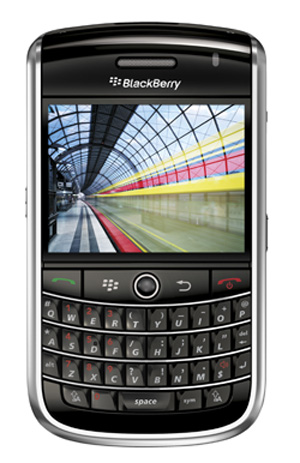


 We spent some enjoyable time earlier this week playing with
We spent some enjoyable time earlier this week playing with 
 Historic photographs and videos are increasingly coming from cell phones and low-resolution point and shoot cameras; and with streaming services such as Qik, we can already watch live, unfiltered news happen right in front of us. With this technology available to practically everyone, anybody equipped with a phone could be the next Abraham Zapruder.
Historic photographs and videos are increasingly coming from cell phones and low-resolution point and shoot cameras; and with streaming services such as Qik, we can already watch live, unfiltered news happen right in front of us. With this technology available to practically everyone, anybody equipped with a phone could be the next Abraham Zapruder. 



 As encouraged as I am to see a quick resolution to this obviously ridiculous example of antagonistic customer "service", I'm reminded that AT&T's rapid and complete response has little to do with its efficient customer service capability [cough] and everything to do with Mr. Savage's wide-ranging, tech savvy celebrity.
As encouraged as I am to see a quick resolution to this obviously ridiculous example of antagonistic customer "service", I'm reminded that AT&T's rapid and complete response has little to do with its efficient customer service capability [cough] and everything to do with Mr. Savage's wide-ranging, tech savvy celebrity. There's an application just launching into beta called thisMoment, and I've had a tab open for it all week in hope that I'll catch some quiet time to try it out. Harry McCracken at Technologizer
There's an application just launching into beta called thisMoment, and I've had a tab open for it all week in hope that I'll catch some quiet time to try it out. Harry McCracken at Technologizer 

 British LCD TV maker Cello Electronics has populated the European budget TV market with devices sporting some atypical features, such as the
British LCD TV maker Cello Electronics has populated the European budget TV market with devices sporting some atypical features, such as the 
 HTC's Hero, finally formally
HTC's Hero, finally formally  The S1 is also billed as capable of withstanding 800 pounds of pressure, and of putting up with temperatures ranging from -4 to 131 degrees Fahrenheit.
The S1 is also billed as capable of withstanding 800 pounds of pressure, and of putting up with temperatures ranging from -4 to 131 degrees Fahrenheit.  TV critic Alan Sepinwall asked Thursday afternoon, of no one in particular on Twitter, if this was the biggest double-celebrity-death day since Jim Henson and Sammy Davis Jr. both exited (May 16, 1990). And for a generation it sure felt like the world, or one's youth anyway, was coming to an end.
TV critic Alan Sepinwall asked Thursday afternoon, of no one in particular on Twitter, if this was the biggest double-celebrity-death day since Jim Henson and Sammy Davis Jr. both exited (May 16, 1990). And for a generation it sure felt like the world, or one's youth anyway, was coming to an end. 

 Greiner's new Web page borrows a New Zealand-based newsletter (which appears to be out of publication since last October) to demonstrate how a non-validated Web page appears when rendered by Outlook. Betanews checked out that newsletter: Abiding by many of the suggestions made by professional Web designers, the CSS for "Soul Purpose" was all embedded in the document -- there were no links to external stylesheets, eliminating one opportunity for cross-site scripting vulnerabilities. E-mail clients that do support full CSS often prefer the code to be embedded in the page rather than linked, so "Soul Purpose" was following the rules.
Greiner's new Web page borrows a New Zealand-based newsletter (which appears to be out of publication since last October) to demonstrate how a non-validated Web page appears when rendered by Outlook. Betanews checked out that newsletter: Abiding by many of the suggestions made by professional Web designers, the CSS for "Soul Purpose" was all embedded in the document -- there were no links to external stylesheets, eliminating one opportunity for cross-site scripting vulnerabilities. E-mail clients that do support full CSS often prefer the code to be embedded in the page rather than linked, so "Soul Purpose" was following the rules.
 Today, Taiwanese mobile phone maker and principal hardware supporter of the Android platform, HTC unveiled its third Android handset, Hero, which is the first to make a departure from the familiar Android UI.
Today, Taiwanese mobile phone maker and principal hardware supporter of the Android platform, HTC unveiled its third Android handset, Hero, which is the first to make a departure from the familiar Android UI. David Wadhwani, Vice President and General Manager of the Platform Business Unit at Adobe said, "As the first Android device with Flash, the new HTC Hero represents a key milestone for Android and the Flash Platform. With close to 80% of all videos online delivered with Adobe Flash technology, consumers want to access rich Web content on-the-go. The collaboration with HTC offers people a more complete Flash based Web browsing experience today and presents an important step towards full Web browsing with Flash Player 10 on mobile phones in the future."
David Wadhwani, Vice President and General Manager of the Platform Business Unit at Adobe said, "As the first Android device with Flash, the new HTC Hero represents a key milestone for Android and the Flash Platform. With close to 80% of all videos online delivered with Adobe Flash technology, consumers want to access rich Web content on-the-go. The collaboration with HTC offers people a more complete Flash based Web browsing experience today and presents an important step towards full Web browsing with Flash Player 10 on mobile phones in the future." I have a copy of Portraits, a book of Steve McCurry's photographs, on my bookshelf. The Afghan girl is on the cover -- you know the photo, yes you do, and those eyes have never left you. McCurry photographed Sharbat Gula in 1985 when she was a 13-year-old refugee, and about seven years ago he found her again, living in a remote region of Afghanistan.
I have a copy of Portraits, a book of Steve McCurry's photographs, on my bookshelf. The Afghan girl is on the cover -- you know the photo, yes you do, and those eyes have never left you. McCurry photographed Sharbat Gula in 1985 when she was a 13-year-old refugee, and about seven years ago he found her again, living in a remote region of Afghanistan. August 15, 2009 > Have you been putting off that Win7 RC download? Get on the stick, because the end is nearing. Microsoft expects to release Windows 7 to manufacturing in July, and
August 15, 2009 > Have you been putting off that Win7 RC download? Get on the stick, because the end is nearing. Microsoft expects to release Windows 7 to manufacturing in July, and  Mr. Jaquith reached out to Mr. Anderson (pictured right) -- who is currently the editor-in-chief of Wired -- and his publishers at Hyperion before going public with the saga on Tuesday in the company blog. Mr. Anderson said he'd correct his "screwups" online by the time the book is released (in July) and in future editions; Hyperion said that was good enough for them.
Mr. Jaquith reached out to Mr. Anderson (pictured right) -- who is currently the editor-in-chief of Wired -- and his publishers at Hyperion before going public with the saga on Tuesday in the company blog. Mr. Anderson said he'd correct his "screwups" online by the time the book is released (in July) and in future editions; Hyperion said that was good enough for them.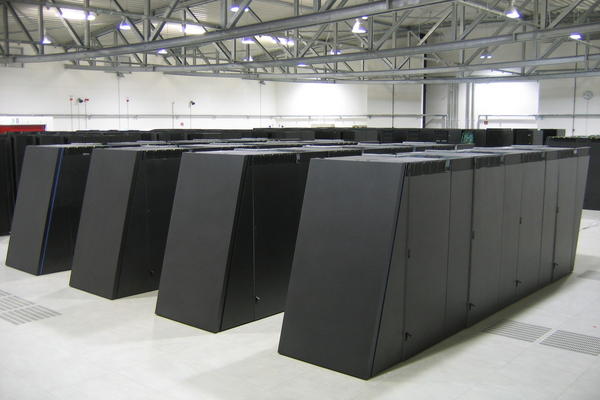
 With the iPhone's 3.0 software update, Apple's iconic touchphone finally has access to AT&T Navigator, the carrier's branded GPS software solution provided by TeleNav, and the first turn-by-turn GPS app for the iPhone.
With the iPhone's 3.0 software update, Apple's iconic touchphone finally has access to AT&T Navigator, the carrier's branded GPS software solution provided by TeleNav, and the first turn-by-turn GPS app for the iPhone. It's an argument we've seen before from Microsoft's competitors and opponents, as well as from many sensible observers: It may be unfair for the manufacturer of the operating system to leverage its customer visibility to advance a free software platform that cuts out commercial competitors. But there's another argument from opponents as well, many of them the same people: Microsoft should be responsible for the health and well-being of its customers' systems when the operating system is threatened, either through malicious use or from system defects.
It's an argument we've seen before from Microsoft's competitors and opponents, as well as from many sensible observers: It may be unfair for the manufacturer of the operating system to leverage its customer visibility to advance a free software platform that cuts out commercial competitors. But there's another argument from opponents as well, many of them the same people: Microsoft should be responsible for the health and well-being of its customers' systems when the operating system is threatened, either through malicious use or from system defects. What it's calling Security Essentials today is a piece of this and a piece of that: the core scanning engine from OneCare, along with the capability to share malware signatures in real-time with the Dynamic Signature Service originally intended for its Forefront commercial package, wrapped together with a front end that effectively substitutes for Windows Defender, and that looks slightly more like an XP product than a Vista product. But at the heart of the system is the first public test of an idea that was supposed to premiere with Forefront last April and didn't: a live database of security events compiled with the aid of perhaps as many as 20 partners.
What it's calling Security Essentials today is a piece of this and a piece of that: the core scanning engine from OneCare, along with the capability to share malware signatures in real-time with the Dynamic Signature Service originally intended for its Forefront commercial package, wrapped together with a front end that effectively substitutes for Windows Defender, and that looks slightly more like an XP product than a Vista product. But at the heart of the system is the first public test of an idea that was supposed to premiere with Forefront last April and didn't: a live database of security events compiled with the aid of perhaps as many as 20 partners.


 "This is just the beginning," said Francisco Carias, product manager for Lenovo's ThinkPad series. Going forward, all ThankPad laptops will be based on the redesigned keyboard. Lenovo is also eyeing future innovations beyond the new laptop's keyboard, multitouch touchpad, and expanded VOIP support.
"This is just the beginning," said Francisco Carias, product manager for Lenovo's ThinkPad series. Going forward, all ThankPad laptops will be based on the redesigned keyboard. Lenovo is also eyeing future innovations beyond the new laptop's keyboard, multitouch touchpad, and expanded VOIP support.

 "Today, when you sit down at a computer and you access a broadband connection, you're not told by your broadband provider that you have to have a Dell or an HP or an Apple in order to access the network," stated Sen. John Kerry (D - Mass.), the former presidential candidate who chaired a portion of Wednesday's hearing. "And when you purchase a wireless phone in Asia or Europe, you typically don't buy it through a wireless carrier. You purchase it separately from the manufacturer or from an outlet."
"Today, when you sit down at a computer and you access a broadband connection, you're not told by your broadband provider that you have to have a Dell or an HP or an Apple in order to access the network," stated Sen. John Kerry (D - Mass.), the former presidential candidate who chaired a portion of Wednesday's hearing. "And when you purchase a wireless phone in Asia or Europe, you typically don't buy it through a wireless carrier. You purchase it separately from the manufacturer or from an outlet." "Exclusive device deals lead to lower prices. Consumers pay well under what AT&T pays Apple for the iPhone. It's a standard US industry practice for the device [to be] sold below its cost, in return for a two-year agreement where the subsidy that made the initial price possible is recovered over the term of the agreement," Roth testified. "In the past two years that the iPhone has been exclusive to AT&T, the price of the iPhone has gone from $399 to $199, and just last week to $99, all while exclusive to AT&T. And with the iPhone at $99, prices of other devices, including other exclusive devices, have dropped and will continue to drop in response to that."
"Exclusive device deals lead to lower prices. Consumers pay well under what AT&T pays Apple for the iPhone. It's a standard US industry practice for the device [to be] sold below its cost, in return for a two-year agreement where the subsidy that made the initial price possible is recovered over the term of the agreement," Roth testified. "In the past two years that the iPhone has been exclusive to AT&T, the price of the iPhone has gone from $399 to $199, and just last week to $99, all while exclusive to AT&T. And with the iPhone at $99, prices of other devices, including other exclusive devices, have dropped and will continue to drop in response to that." "There is harm in urban areas as well. Consumers who desire an iPhone or a BlackBerry Storm smartphone cannot use it on our network, even if they prefer our service," Rooney continued. "We do not understand how the public can possibly be served by such a practice. If you take away nothing else from this meeting, I want you to understand a central goal of policy makers should be to enable consumers to buy the handset they want, and choose the service that best suits their needs."
"There is harm in urban areas as well. Consumers who desire an iPhone or a BlackBerry Storm smartphone cannot use it on our network, even if they prefer our service," Rooney continued. "We do not understand how the public can possibly be served by such a practice. If you take away nothing else from this meeting, I want you to understand a central goal of policy makers should be to enable consumers to buy the handset they want, and choose the service that best suits their needs." "Near-exclusive reliance by wireless carriers and their agents on a single business model, which combines wireless service and handsets used to access the service, strongly influences what kinds of services the handset can perform, and what kind of software the subscriber can download," said Prof. Frieden. "This combination of handset and service also creates incentive for carriers to secure exclusive distribution rights for choice devices such as the Apple iPhone. It motivates carriers to favor ways to recoup their handset subsidies rather than to concentrate on offering unconditional access to the features within the handset, or services available by downloading software and content to the handset."
"Near-exclusive reliance by wireless carriers and their agents on a single business model, which combines wireless service and handsets used to access the service, strongly influences what kinds of services the handset can perform, and what kind of software the subscriber can download," said Prof. Frieden. "This combination of handset and service also creates incentive for carriers to secure exclusive distribution rights for choice devices such as the Apple iPhone. It motivates carriers to favor ways to recoup their handset subsidies rather than to concentrate on offering unconditional access to the features within the handset, or services available by downloading software and content to the handset." "Consumers will remain protected from demonstrable anti-competitive activity or unfair and deceptive practices in this sector by our antitrust and consumer protection authorities. The FCC has repeatedly found the wireless marketplace to be effectively competitive -- not perfectly competitive, but effectively competitive," Esbin testified. "Carriers are willing to pay for exclusive arrangements because offering subscribers a hot new handset is a way to differentiate their services. The FCC has acknowledged that product differentiation is a natural competitive response by carriers to customer churn. Churn itself is a sign of competition, and the exclusive arrangements are simply a feature in an intensely competitive market. And handset manufacturers benefit from the exclusives by being able to develop the initial version of a device for one type of network, ensuring both speed to market and some control over the user experience. Guaranteed minimum order from the manufacturer, another common feature, can remove some of the risks associated with a new product offering, thus permitting riskier and more innovative designs."
"Consumers will remain protected from demonstrable anti-competitive activity or unfair and deceptive practices in this sector by our antitrust and consumer protection authorities. The FCC has repeatedly found the wireless marketplace to be effectively competitive -- not perfectly competitive, but effectively competitive," Esbin testified. "Carriers are willing to pay for exclusive arrangements because offering subscribers a hot new handset is a way to differentiate their services. The FCC has acknowledged that product differentiation is a natural competitive response by carriers to customer churn. Churn itself is a sign of competition, and the exclusive arrangements are simply a feature in an intensely competitive market. And handset manufacturers benefit from the exclusives by being able to develop the initial version of a device for one type of network, ensuring both speed to market and some control over the user experience. Guaranteed minimum order from the manufacturer, another common feature, can remove some of the risks associated with a new product offering, thus permitting riskier and more innovative designs." "Will Congress sit by and allow the largest carriers to lock the most attractive netbooks into exclusivity agreements before this segment of the market fully emerges?" Meena asked the Sen. Commerce Committee members last Wednesday. "Left unchecked in this segment of the PC market, the largest wireless carriers will gain control and begin to restrict PC innovation and distribution, just as they have wireless handsets. Furthermore, the claim that exclusivity agreements drive innovation is completely unfounded in this segment of the market. Companies like Dell, Acer, and others were advancing the netbook market well before the largest carriers got involved. How, then, can the largest carriers claim a divine right to exclusivity on netbooks?"
"Will Congress sit by and allow the largest carriers to lock the most attractive netbooks into exclusivity agreements before this segment of the market fully emerges?" Meena asked the Sen. Commerce Committee members last Wednesday. "Left unchecked in this segment of the PC market, the largest wireless carriers will gain control and begin to restrict PC innovation and distribution, just as they have wireless handsets. Furthermore, the claim that exclusivity agreements drive innovation is completely unfounded in this segment of the market. Companies like Dell, Acer, and others were advancing the netbook market well before the largest carriers got involved. How, then, can the largest carriers claim a divine right to exclusivity on netbooks?" But why shouldn't a customer of Rooney's US Cellular, for instance, have the right to purchase an iPhone for whatever price US Cellular might make it available, Kerry proceeded. Roth responded that the real reason was because US Cellular -- along with Cellular South, which was also represented -- made the wrong choice of network protocols: CDMA as opposed to GSM, which he described as the global standard and the one that AT&T, and any other network that cares about customers, supports. Comparing CDMA to GSM, Roth argued, was like comparing VHS to Beta, in that order.
But why shouldn't a customer of Rooney's US Cellular, for instance, have the right to purchase an iPhone for whatever price US Cellular might make it available, Kerry proceeded. Roth responded that the real reason was because US Cellular -- along with Cellular South, which was also represented -- made the wrong choice of network protocols: CDMA as opposed to GSM, which he described as the global standard and the one that AT&T, and any other network that cares about customers, supports. Comparing CDMA to GSM, Roth argued, was like comparing VHS to Beta, in that order. For all the wild success Steve Jobs has achieved in business, he remains a husband and a father facing down a serious, potentially life-ending illness. The image of a robust, confident, billionaire captain of industry clad in his iconic black turtleneck and jeans as he delivers yet another blockbuster message to the world does little to mask the frightening reality of his current state. Sick or not, every CEO eventually leaves the post. And life goes on.
For all the wild success Steve Jobs has achieved in business, he remains a husband and a father facing down a serious, potentially life-ending illness. The image of a robust, confident, billionaire captain of industry clad in his iconic black turtleneck and jeans as he delivers yet another blockbuster message to the world does little to mask the frightening reality of his current state. Sick or not, every CEO eventually leaves the post. And life goes on.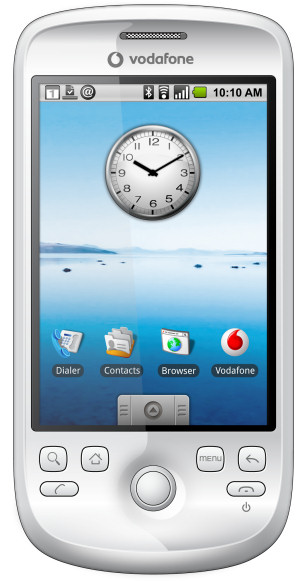

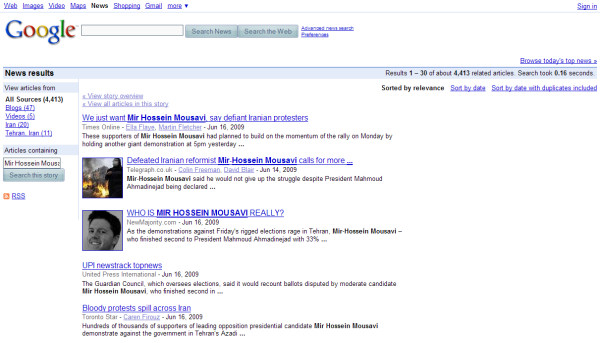
 Various people have talked about geek communication styles over the years. In particular, there was a blog by Michael Schwern a while back (Geek 2 Geek) that had some interesting thoughts on how the geek mind works. Sadly, it went dark some time ago; I never sent a note to Mr. Schwern telling him how much I enjoyed the blog, and honestly I hadn't thought about it for a long time until lo!, I see he's presenting at OSCon next month on
Various people have talked about geek communication styles over the years. In particular, there was a blog by Michael Schwern a while back (Geek 2 Geek) that had some interesting thoughts on how the geek mind works. Sadly, it went dark some time ago; I never sent a note to Mr. Schwern telling him how much I enjoyed the blog, and honestly I hadn't thought about it for a long time until lo!, I see he's presenting at OSCon next month on 

 Next Tuesday at the
Next Tuesday at the  For fanatics of anything, camping out in line for the latest product or event is a chance to show off their loyalty and devotion to whatever their chosen obsession may be. Waiting for hours in unforgiving conditions creates a real camaraderie between folks, and helps soften a person's judgment of the product they waited for.
For fanatics of anything, camping out in line for the latest product or event is a chance to show off their loyalty and devotion to whatever their chosen obsession may be. Waiting for hours in unforgiving conditions creates a real camaraderie between folks, and helps soften a person's judgment of the product they waited for. Apple has made the process of obtaining the new iPhone much smoother, and in doing so, much less exciting. Customers who pre-ordered the device can pick up their reserved iPhone at their leisure, or get it
Apple has made the process of obtaining the new iPhone much smoother, and in doing so, much less exciting. Customers who pre-ordered the device can pick up their reserved iPhone at their leisure, or get it 



 Quick question: What's cooler, a guy with a Bluetooth headset, or a Secret Service agent? If your answer was "neither," you might want to divert your eyes from Motorola's new Endeavor HX1 bone conduction Bluetooth headset. The not-yet-available Endeavor HX1 is Motorola's first attempt at marketing a Bluetooth headset with a bone conduction microphone in addition to its typical noise-canceling audio microphone.
Quick question: What's cooler, a guy with a Bluetooth headset, or a Secret Service agent? If your answer was "neither," you might want to divert your eyes from Motorola's new Endeavor HX1 bone conduction Bluetooth headset. The not-yet-available Endeavor HX1 is Motorola's first attempt at marketing a Bluetooth headset with a bone conduction microphone in addition to its typical noise-canceling audio microphone. 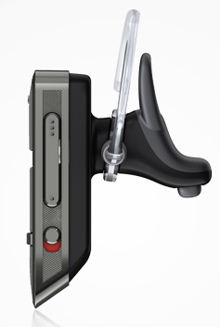

 Santa Barbara-based Solid Oak set up a hue and cry over the weekend, saying that China's "Green Dam Youth Escort" filtering software bears unmistakable proof of piracy. Examination of the software and its server logs seems to indicate the company is correct -- aside from the long list of sites to be filtered, there are bits of familiar code and even calls back to Solid Oak's servers. (Chinese officials have flatly denied that any intellectual property was stolen, and a subsequent update to the package eliminated many of the callbacks and other suspect code.)
Santa Barbara-based Solid Oak set up a hue and cry over the weekend, saying that China's "Green Dam Youth Escort" filtering software bears unmistakable proof of piracy. Examination of the software and its server logs seems to indicate the company is correct -- aside from the long list of sites to be filtered, there are bits of familiar code and even calls back to Solid Oak's servers. (Chinese officials have flatly denied that any intellectual property was stolen, and a subsequent update to the package eliminated many of the callbacks and other suspect code.)


 Just as the eagerly-awaited iPhone 3.0 software update became available, AT&T made an announcement that some subscribers' upgrade eligibility would be bumped up just in time for the iPhone 3G S launch this Friday.
Just as the eagerly-awaited iPhone 3.0 software update became available, AT&T made an announcement that some subscribers' upgrade eligibility would be bumped up just in time for the iPhone 3G S launch this Friday.
 What we've been calling a "perception problem" with Windows Vista -- the notion that users may tend to think it's less secure or reliable than it has proven to be on a large scale -- isn't just about perception for users faced with severe unreliability issues. As a Windows user for over two decades, I have been to the far depths of unreliability, and have lived to tell the tale. Probing the problems with Windows is actually part of my job, and one reason I actually am a Windows user -- unlike the rest of the world.
What we've been calling a "perception problem" with Windows Vista -- the notion that users may tend to think it's less secure or reliable than it has proven to be on a large scale -- isn't just about perception for users faced with severe unreliability issues. As a Windows user for over two decades, I have been to the far depths of unreliability, and have lived to tell the tale. Probing the problems with Windows is actually part of my job, and one reason I actually am a Windows user -- unlike the rest of the world. What's more, the fact that you can see a piece of your desktop wallpaper through the transparency of the Sticky Keys dialog's title bar (though this screenshot was taken later) is a clear indicator that Windows is running perfectly, and the Black Screen is just a very effective façade.
What's more, the fact that you can see a piece of your desktop wallpaper through the transparency of the Sticky Keys dialog's title bar (though this screenshot was taken later) is a clear indicator that Windows is running perfectly, and the Black Screen is just a very effective façade.
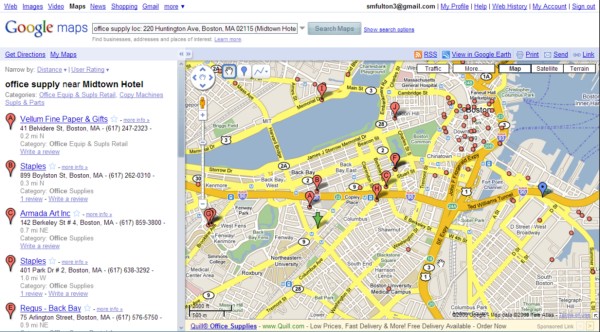


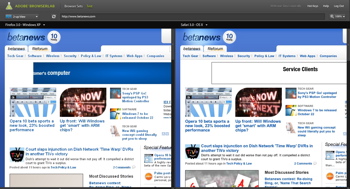




 Today, Nokia announced that the N97, the newest handset in its flagship N-series, will go on sale in 75 countries this month. The device was first unveiled
Today, Nokia announced that the N97, the newest handset in its flagship N-series, will go on sale in 75 countries this month. The device was first unveiled  You know the guy I'm talking about. What's-his-name. The guy with the big chin, from that movie you like that had the girl in it. Kind of rugged. Looks a little like Scott Bakula. Not William Holden.
You know the guy I'm talking about. What's-his-name. The guy with the big chin, from that movie you like that had the girl in it. Kind of rugged. Looks a little like Scott Bakula. Not William Holden.
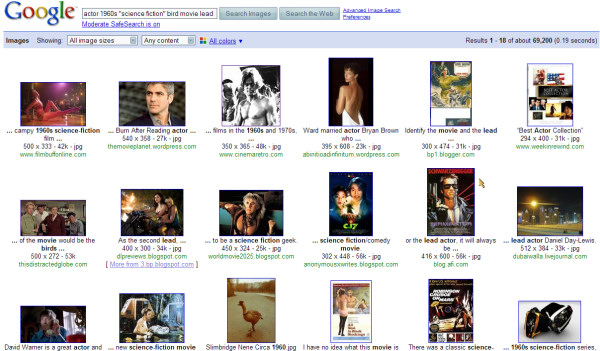
 June 1984 · A quarter-century ago this week, Alexey Pajitnov stayed up late and turned the well-known Pentamino Puzzle into a computer game for Electronika, a Russian computer system. The rest is
June 1984 · A quarter-century ago this week, Alexey Pajitnov stayed up late and turned the well-known Pentamino Puzzle into a computer game for Electronika, a Russian computer system. The rest is  The Supreme Court wasn't necessarily expected to grant the a certiorari for Bilski v. Doll, a case involving a denied patent application for a method of using masses of data, specifically weather data, to predict movement and hedge bets on the commodities market. That they did agree to look at the case indicates that we may, very soon, see the definitive close of an ugly period in patent law as it applies to technology.
The Supreme Court wasn't necessarily expected to grant the a certiorari for Bilski v. Doll, a case involving a denied patent application for a method of using masses of data, specifically weather data, to predict movement and hedge bets on the commodities market. That they did agree to look at the case indicates that we may, very soon, see the definitive close of an ugly period in patent law as it applies to technology.